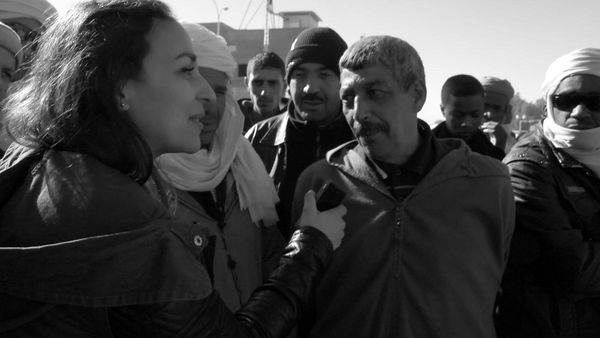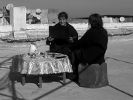Eye For Film >> Movies >> Investigating Paradise (2017) Film Review
Investigating Paradise
Reviewed by: Amber Wilkinson

Merzak Allouache expertly sews his documentary into a fictional framework for his latest film, which has the hate preaching of ultra-conservative Wahhabism in its sights. The non-documentary element allows him to give a strong woman's voice in a film, that by the very nature of what he is exploring - the promise that paradise will bring 72 houris (heavenly virgins) to all good Muslims - features a lot of masculine voices.
Salima Abada plays Nedjima, an Algerian journalist who is investigating jihadist propaganda and discovers videos from preachers detailing in lascivious detail, just what is meant by those houris (it's worth noting that some Quranic scholars believe that the houris refer not to virgins but raisins, although this is not mentioned here, the film makes it clear that the erotic detail the preacher goes into is most certainly not contained in the Quran).

Surprised by the sexualised nature of the preacher's description, Nedjima and her assistant Mustapha set out to investigate what various groups of people across the country think awaits them in the afterlife. Her story is more than just a simple bridging element between interviews, building up its own head of steam that dovetails the fictional tale with the documentary element through recollection of a terror attack during the Civil War of the Nineties.
The meat of the material here, however, is the vox pop element - which is informative, often funny and sometimes terrifying. Nedjima questions young men, in particular, pushing them to consider, if men are getting all those virgins, what exactly women might have in store. What happens to their wives, for example? And why 72? Many of them aren't sure at all - one more or less suggests that they basically sit on a pedestal all day, just tending to their beautiful appearances. Quite a few of the women questioned don't seem to have thought about it too much either, although they seem to be mostly hoping for a bit of peace.
Many of the younger interviewees seem enthused by the idea of what awaits, a worry given the radicalisation of the young in recent times - although a visit to a cyber cafe suggests for most, like kids everywhere, religion is not top of their agenda. Meanwhile, many of the older people questioned point to the problems of sexual frustration among the youth of the country, driven by devout religion, which lead this sort of eroticised preaching to win over support.
Allouache gives a real sense of the divisions within the country, particularly evident when Nadjima travels to the more religiously traditional south, where none of the women are prepared to speak to her on camera. The division of viewpoint seems to be also split along class lines, with those better educated, more affluent interviewees laughing at the very idea, while the younger, apparently poorer, majority are more willing to buy in to belief. There is notable balance, however, as a Salafist preacher she finally speaks to says people should be concerned with creating paradise in the here and now rather than worrying about the afterlife.
Unsurprisingly, the picture that emerges is complex, with many of these virginal fantasies seemingly not homegrown at all, but imported from Saudi Arabia - where money isn't an issue when it comes to creating religious propaganda. As one writer puts it, this is as much a culture war as a physical one - with one viral video able to speak to thousands before the local muezzin has even finished his call to prayer. At more than two hours long, the second half of the film could do with some judicious editing back, particularly in its fictional portions, but this is a fascinating addition to the debate of radicalisation that retains a hopeful element despite its sharp home truths.
Reviewed on: 28 Mar 2018














